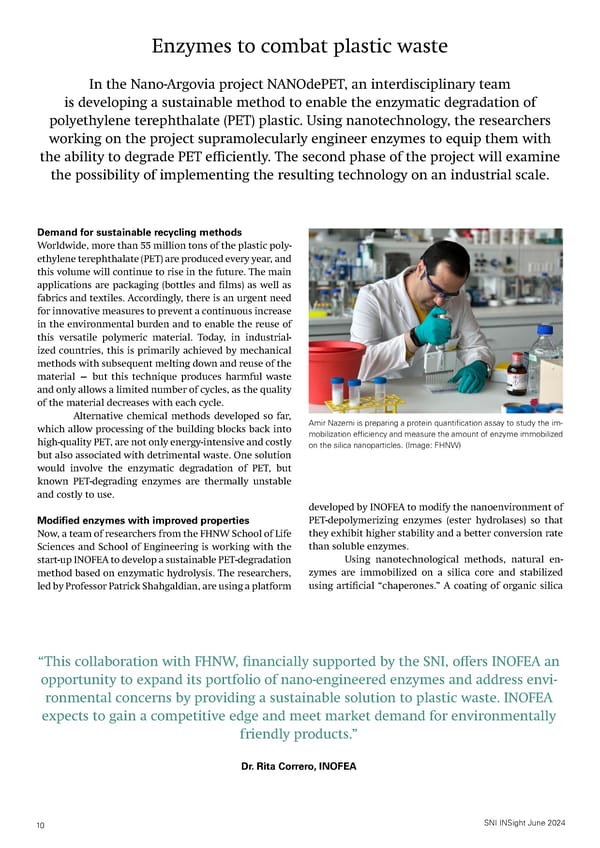Enzymes to combat plastic waste In the Nano-Argovia project NANOdePET, an interdisciplinary team is developing a sustainable method to enable the enzymatic degradation of polyethylene terephthalate (PET) plastic. Using nanotechnology, the researchers working on the project supramolecularly engineer enzymes to equip them with the ability to degrade PET e昀케ciently. The second phase of the project will examine the possibility of implementing the resulting technology on an industrial scale. Demand for sustainable recycling methods Worldwide, more than 55 million tons of the plastic poly- ethylene terephthalate (PET) are produced every year, and this volume will continue to rise in the future. The main applications are packaging (bottles and 昀椀lms) as well as fabrics and textiles. Accordingly, there is an urgent need for innovative measures to prevent a continuous increase in the environmental burden and to enable the reuse of this versatile polymeric material. Today, in industrial- ized countries, this is primarily achieved by mechanical methods with subsequent melting down and reuse of the material — but this technique produces harmful waste and only allows a limited number of cycles, as the quality of the material decreases with each cycle. Alternative chemical methods developed so far, Amir Nazemi is preparing a protein quanti昀椀cation assay to study the im- which allow processing of the building blocks back into mobilization ef昀椀ciency and measure the amount of enzyme immobilized high-quality PET, are not only energy-intensive and costly on the silica nanoparticles. (Image: FHNW) but also associated with detrimental waste. One solution would involve the enzymatic degradation of PET, but known PET-degrading enzymes are thermally unstable and costly to use. developed by INOFEA to modify the nanoenvironment of Modified enzymes with improved properties PET-depolymerizing enzymes (ester hydrolases) so that Now, a team of researchers from the FHNW School of Life they exhibit higher stability and a better conversion rate Sciences and School of Engineering is working with the than soluble enzymes. start-up INOFEA to develop a sustainable PET-degradation Using nanotechnological methods, natural en- method based on enzymatic hydrolysis. The researchers, zymes are immobilized on a silica core and stabilized led by Professor Patrick Shahgaldian, are using a platform using arti昀椀cial “chaperones.” A coating of organic silica “This collaboration with FHNW, 昀椀nancially supported by the SNI, o昀昀ers INOFEA an opportunity to expand its portfolio of nano-engineered enzymes and address envi- ronmental concerns by providing a sustainable solution to plastic waste. INOFEA expects to gain a competitive edge and meet market demand for environmentally friendly products.” Dr. Rita Correro, INOFEA SNI INSight June 2024 10
 SNI INSight June 2024 Page 9 Page 11
SNI INSight June 2024 Page 9 Page 11